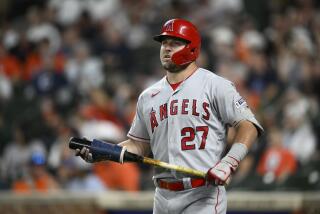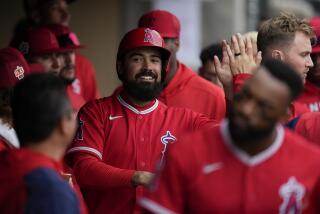For Ken Griffey Jr., the playing’s the thing
- Share via
SEATTLE — Seattle Mariners third baseman Adrian Beltre came to the plate last Tuesday against the Angels for the first time since sitting out three weeks because of a severely bruised right testicle, the result of a bad-hop grounder.
His walk-up music on the Safeco Field sound system?
An excerpt from Tchaikovsky’s “The Nutcracker Suite.”
It took one guess to figure out the culprit behind the gesture.
“Would I do something like that?” Ken Griffey Jr. said, feigning mock indignation before breaking into a wide, toothy grin. “I would never do anything like that.”
Before sitting for an interview, Griffey, the 39-year-old designated hitter whose 625 home runs rank fifth on baseball’s all-time list, issues neckties to all his teammates to wear on the team plane.
They are bright white, with stencil-like drawings of either Seattle right fielder Ichiro Suzuki’s face or Suzuki’s dog, a Shiba Inu. Suzuki promptly ties one into a Windsor knot to wear over his batting-practice jersey.
As Griffey speaks about his distinguished 21-year career, the injuries that robbed him of a chance to challenge the home run record and his decision to return to Seattle after nine years away, teammates are playing with a remote-control dune buggy in the clubhouse. They set up a little plywood ramp and crack up when the car jumps through the air and nearly crashes into Griffey’s feet.
Griffey revels in the frivolity.
A game against the Angels will begin in about an hour.
“You know, his nickname is ‘The Kid,’ and he has fun,” teammate Mike Sweeney said of Griffey. “Whether he had a two-homer game or went 0 for 4, he’s the same guy. He just has fun every day.
“I’ve been around guys like that, but never one with 600-plus home runs. Usually, guys who have that much fun and take things so lightly don’t last. But he’s so talented, that easygoing mind-set helps him be one of the best to play the game.”
It has also helped transform a dysfunctional team that lost 101 games amid clubhouse dissension in 2008 into a unified group that has returned to respectability in 2009, with a 72-66 record entering tonight’s game in Angel Stadium.
Much of the discontent centered on a disenchantment with the team’s star, Suzuki. Griffey has worked hard to break down the walls that isolated Suzuki from the rest of the team by often including the outfielder in clubhouse banter.
Griffey, who still wears his cap backward for batting practice as he did as a carefree, 19-year-old rookie in 1989, has been equal parts sage and class clown, a mentor to youngsters and consensus-builder among veterans, the judge of the team’s kangaroo court.
“What he’s done has gone way beyond Xs and O’s, batting stats and other things like that,” General Manager Jack Zduriencik told the Seattle Times last week. “It’s put- ting a stamp on this team. . . . He’s brought to the table credibility.
“When he walks into that locker room, younger players, who want to know how to be a professional, have watched him this year and they’ve learned from him. It’s been a nice marriage.”
But will it last beyond this season? Griffey’s homecoming -- he spurned an offer from Atlanta to sign with the Mariners -- has been a feel-good story in Seattle, where fans have embraced the player Sweeney calls “the face of the franchise,” the center fielder who made 10 All-Star teams, won 10 Gold Gloves and the 1997 American League MVP award during his first Mariners stint from 1989-99.
But that sweet, fluid, powerful, almost effortless stroke that made him a superstar from the day he set foot in the big leagues is not as lethal anymore. Recurring knee issues -- he had surgery on his right knee last October -- have reduced Griffey to a platoon DH.
He is batting .218 with 14 homers and 43 RBIs in 97 games for a rebuilding team that lacks the power to contend in the AL West.
And there are family issues. The Mariners accommodated Griffey’s request to be traded after 1999 to be closer to his Orlando, Fla., home, and his kids are now 15 (Trey), 13 (Taryn) and 8 (Tevin).
“I grew up in baseball, so I know how hard it is to not have a dad around to see sporting events and stuff like that,” said Griffey, who was dealt after that ’99 season to Cincinnati, the team his father, Ken Griffey, starred for.
“It was tough. My kids are getting to the point where they want their dad around, and it’s not going to be much longer when I’m not going to be around.”
Yet, when asked if he has another year left in him, Griffey said, “Uh, yeah. It would be nice. But right now, it’s more important that I focus on the work here.”
Much of the heavy lifting has been done, with Griffey’s playful personality and pranks lightening the mood in what was a sour, and often toxic, clubhouse last season.
“That’s just me being me,” Griffey said, when asked if he was aware of the effect he’s had on the team. “We have guys with different nationalities, different backgrounds, but there’s no reason everyone can’t get along.
“No one is perfect. Your ERA is not zero. You’re not going to have 30 wins. And your batting average isn’t going to be 1.000. So you don’t have the right to verbally talk out about somebody. Look at yourself. Did you do everything you could do? Did you start your day off right? Are you perfect?”
For many players, Griffey has been the perfect role model, a graceful outfielder with the fearlessness to crash into walls, a slugger with prodigious power but without the oversized ego.
“He’s a great guy, always smiling,” Angels center fielder Torii Hunter said. “One day in 1998, I struck out to end the inning. I was kind of upset as I ran onto the field, and he stayed out there and waited -- he told me to slow down so he could talk to me. He said, ‘Man, you’re going to be a great player. Just keep learning, be patient, don’t get discouraged, keep having fun and watch what happens.’
“Eleven years later, here I am.”
One reason Griffey continues to be revered is that he is one of the few sluggers of this generation who has not been tainted by steroids, which lends more legitimacy to his home run totals.
“Now, people look at my numbers and say, ‘Oh . . . yeah . . . OK,’ ” Griffey said. “It’s unfortunate some of the situations we’ve run into over the last 10 years. We have some great young power hitters in the game who we should be celebrating. Hopefully, we can put our energy into watching these guys instead of on what happened.”
When sizing up Griffey’s career, it’s impossible not to wonder: What would he have accomplished with better health? He’s been on the disabled list nine times, injuries robbing him of about 620 games, the equivalent of almost four seasons.
“He’d probably have 700-plus home runs,” Hunter said. “And I promise you, he’d still be doing his thing in center field.”
Griffey, who has played in only 18 postseason games and never in a World Series, has no regrets.
“Everybody plays the what-if game -- if John Elway had better receivers, he might have won four Super Bowls,” Griffey said. “To win a World Series, the whole team has to be hot, everything has to go your way. I won’t be upset if I don’t win a ring, because I gave it my all.”
As for the personal numbers, “It’s a Catch-22,” Griffey said. “If you don’t play hard, they’ll wonder, ‘What would his numbers be if he played harder?’ Or, ‘He played too hard. He ran into all those walls. What would he have done if he wasn’t hurt?’ ”
If this is his last season, don’t cry for Griffey. He has made almost $150 million in this game and knows he has led a charmed life.
“I’ve never had to come in to work because I don’t consider baseball work,” Griffey said. “Work is something you don’t want to do, but you have to. I enjoy it, whether it’s good or bad.”
--
More to Read
Go beyond the scoreboard
Get the latest on L.A.'s teams in the daily Sports Report newsletter.
You may occasionally receive promotional content from the Los Angeles Times.







